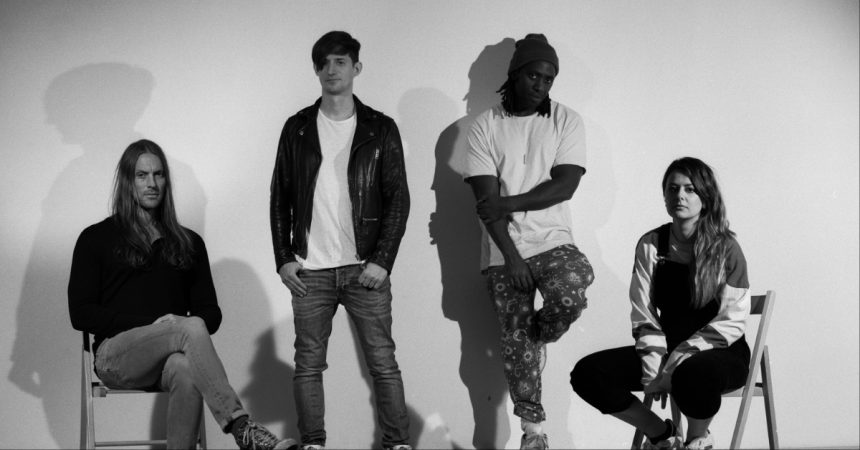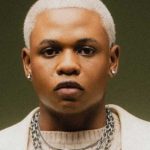For just shy of two decades, Bloc Party have subverted expectation.
From 2005’s critically acclaimed Silent Alarm, which birthed the immortal guitar anthems “Banquet” and “Helicopter,” to 2008’s electro-clashing Intimacy, the four-piece have refused to stand still. Throughout their explorative and innovative journey, founding members vocalist and guitarist Kele Okereke and guitarist Russell Lissack — along with latter-day additions bassist Justin Harris and drummer Louise Bartle — have littered their path with remixes and EPs, and 2023 is no different.
Following on from last year’s Alpha Games — a return to their stalactite-sharp guitar lines and crushingly emotive lyrics — and on the back of a recent U.K. tour supporting Paramore, The High Life is another selection of Bloc Party’s creative chemistry. It sonically weaves outward from Alpha Games with ebullient flurries (“High Life”) and potent love (“Blue”, “The Blood Moon”). It also marks the first time the four-piece have allowed a fifth into their midst. Featuring burgeoning breakout emo star KennyHoopla on “Keep It Rolling,” The High Life continues establishing the Brit icons’ fearless expedition to the outer edges of indie. Here, Lissack breaks down what this latest release means for them and what, if anything, comes next.
So, is The High Life EP a collection of tracks left over, or inspired by, the end of Alpha Games?
It was a continuation. They were all written after the album. Actually, no, one of them we did start during the Alpha Games writing session — “Blue” was an unfinished song that we went back and changed up. The other three were completely separate from that, but it’s always been something we’ve done. Historically, we seem to put an album out and then start touring, and once we’re touring, that tends to bring about a different creativity when everyone’s playing together all the time.
Is that creative restlessness?
We’re just generally quite creative people — someone always has ideas on the go. So it always feels like we aren’t short on song ideas. We’ve always been keen to release as much music as possible, rather than to hold back. There’s always been a balance in how you do that, and it’s certainly changed a lot over the time that we’ve been professional musicians. There’s that balance of satisfying your personal levels of creativity and how you find an outlet for that.
These tracks sit as four separate entities. What was the intention of showcasing these slightly divergent sounds?
It didn’t feel like they all came from the same place, at least musically. “Blue” was the one from the Alpha Games sessions that got abandoned halfway through. “Keep It Rolling” was quite unusual. It’s a collaboration with another artist, which we’ve never done before. It was something that our singer, Kele, had started working on separately a couple of years ago, and that didn’t get finished. Then the other two, “High Life” and “The Blood Moon,” were written around the same time. We did a writing session at the start of this year, and we came up with about three or four ideas. Those two were the favorites of that session. So, in that sense, the EP ended up being these ideas that came from different places and different periods, but they ultimately seemed to sit quite well together.
As you mentioned, it marks the first time Bloc Party have released a collaboration. How was that?
We didn’t have any interactions with Kenny because his vocals were already written on the idea when Kele brought it to us. I think he later redid some of them, but that was done on his end. It’s something I’ve always been open to. I’ve worked with lots of people over the last however many years of being a musician, so it’s always something I’ve been happy and excited to do. But Kele brought us the demo and played it, and everyone was into it straightaway. I didn’t actually know much of KennyHoopla’s music at the time, so I investigated his stuff, and it was really cool. It felt totally our vibe, so everyone was excited to have him on board. It’s something I’d be open to doing again in the future. It’s nice having a fresh input on things. It makes something sound different from anything you’ve done before, which has always been something that Bloc Party as a band have pursued.
Bloc Party have never shied away from remixes and EPs. They all play a big part in your bigger catalog — does this help you harness where Bloc Party could go next?
In a way, it’s more of a full stop on a period than a stepping stone. It feels like, “OK, we did that, and we are happy with how that panned out.” There tend to be longer periods between activity — I don’t know when we’ll make music together again — so if, and when we do, everyone will probably be in quite different places once again. Whatever we’ve done now will probably be more of a reflection of this moment in time, rather than any kind of indicator of what would happen next. If anything, historically, we’ve tended to go in the opposite direction of whatever we’ve done previously. So they feel like little captured moments rather than a trajectory of any sort.
What does The High Life EP offer you in terms of creatively closing the chapter of Alpha Games?
The last few years have meant that we’ve written music before we’ve performed and before we’ve toured together for a period, and as soon as we start playing the songs, the chemistry changes, and our perception of them changes. So this EP is almost a slight refinement of what we were trying to do. It feels like a learning process in that you keep discovering what works best for you, and what prompts your creativity. I was saying to Louise, our drummer, recently that I miss how when we first started that we didn’t have that opportunity to record songs. We were touring and writing songs, and they were getting played and then recorded. I miss that part of the process. If we do stuff in the future, I think it would be beneficial to do that again.
Is there a difference in creative feeling with the EPs compared to an album?
It feels slightly less pressure because once you engage in this process of “This is going to be an album,” then there’s this structure to the future of how it’s going to work, and various other people tend to get involved in the process — which isn’t a bad thing, per se, but things become slightly dictated by timeline, whereas with this, it feels a lot more relaxed. It’s completely on our terms.
EPs and remixes seem to help Bloc Party remain fluid and establish that you’re unafraid of experimenting.
It feels like it’s been part of the band’s history. I can think back over the course of our albums and the little singles we’ve done in between, and they maybe don’t necessarily connect with what just happened in an obvious way, but they’ve always felt [like] strong little moments in between albums. So I think it’s been a good way of doing things for us.
We had a meeting during COVID, and we were talking about not even doing an album. We were talking about just putting out a series of EPs instead. That didn’t materialize in the end, but even now going forward, especially with the way that the music industry has changed, I feel like, if anything, there’s probably more merit than ever in doing that kind of thing. There’s more opportunity to do that as well. The traditional album model of the last 50 years feels less important than ever, again, for better or worse.
Wrapping up, how has the release of Alpha Games been now it’s been out for a year?
I’m really happy with the album. The tracklisting was a collaboration, and some sacrifices had to be made, and some songs people liked didn’t make it, but overall I was pretty happy with what we did. I thought it was a good reflection of where our head was at. Certainly, the process of recording it was really enjoyable. I think that timing made it difficult. We didn’t do a lot of touring for it, which felt like a bit of a shame because it felt like an album that comes to life completely when the band is playing it. It’s weird: It’s one of those things with albums [that] the moment you release it, it feels like it’s gone. It’s the past — I’ll never listen to it again. I’ll never listen to any of our records other than if I need to learn a song that we haven’t played for a long time. The people who listen to it, it’s their music now. In a way, it’s hard to look back and think how you feel about it, but I know I was happy.









